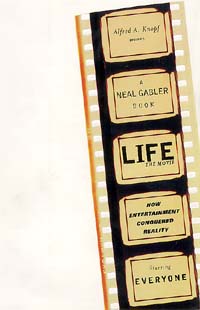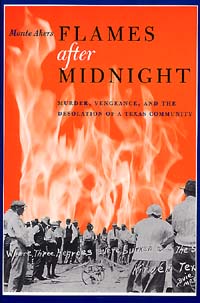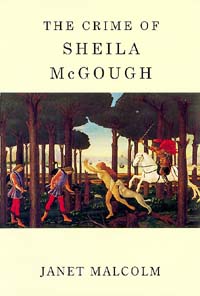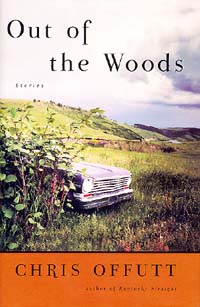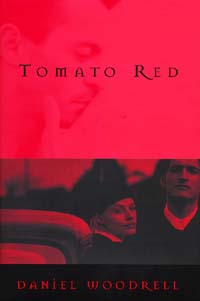Alternate Universes
Fri., March 12, 1999
| Pandaemonium: A Novel |
At its center, the book is a tale of one man's lifelong work toward making the greatest piece of drama ever created. The man is Rudolph Beckmann, an Eastern European Jew who adds a "Von" to his name, thus erasing his ethnicity, and rises to become the leading film producer in the new American goldmine of film. By his side is the breathy Magadalena Mezaray, a starlet more sexy than Garbo, and Peter Lorre, née Laszlo Loewenstein, another self-created gossip-column figure. At the outset of the book, the three are on board a transatlantic flight to Salzburg, where the first incarnation of Von Beckmann's great drama will be staged. The production is a highly dramatic Antigone, the performance of which is interrupted by a failed assassination attempt against der Führer himself, who sits in the front row. Coincidence, or more? It's a question one asks often when reading this book, as Mezaray ends up a virtual love slave to Adolf Hitler, Lorre receives advance warning of the Pearl Harbor invasion (which he learns was inspired by one of his movies), and an illiterate native of Borneo catches a canister full of old film that presumably falls from the sky. Well, hey -- nobody ever claimed that verisimilitude was a virtue of Hollywood anyway.
But wait, what exactly did the Borneo man find in that old canister? Answer: Von Beckmann's final masterpiece, an American Western film version of Antigone titled Pandaemonium, never to be seen by any audience. The director, after having his Jewish identity exposed by the Nazis and serving a short sentence in a concentration camp, plans his film to be a reflection of truth, an exposé of the horrors of the Reich. In creating the movie, though, Von Beckmann himself becomes a second führer, isolating his cast and crew in the Nevada desert, depriving them of water and food, using hypnotic rhetoric to gain their allegiance, and resorting to virtual warfare to keep their production going. In the end, the secret enterprise evolves into the most anticpated film in the world. What nobody knows is that everything captured on celluloid is real -- an entire village is massacred, and the cult-like cast of actors goes on with their lines, stepping with bare feet on the blood of the dead.
Heavy stuff for a Hollywood novel, of course, but it captures the self-importance and illusion of what we sometimes call the "entertainment" industry -- well, sort of. When Epstein isn't knitting B-movie actors into these huge sagas of history, though, he is sweetly spinning a lifestyles-of-the-rich-and-famous plot that even Fitzgerald might savor. The great strength of this secondary plot, and frankly of the whole book, is Epstein's use of Lorre as a witty and self-indulgent narrator who, for the most part, just wants to get laid. Unfortunately, every time he is even slightly intimate with a woman, he breaks into a bitter, almond-odored sweat. Thus his perpetual defeat. This fictional version of Peter Lorre is not at all a complex figure, but he is (surprise) an overly dramatic delight. At one point, he even plots to kill a beefy male actor because of his affair with the sexpot that Lorre admires. In the end, the reader's judgment of Epstein's Lorre comes indistinguishably close to that of the work as a whole: Both are unstable and pompous, sure, but who can resist their smart charm? --David Garza
|
|
Gabler goes to great lengths early on to make sure we know this isn't an outline for a curative for what ails us -- he seeks only to grab up the garden rock and shine the white light of the obvious on the skittering things beneath. And while much of what Gabler -- whose previous book, An Empire of Their Own: How the Jews Invented Hollywood, was an equally accessible scholarly work -- has to say appears to have come from a steamer trunk clearly marked "obvious," there's no denying that his final argument, the self-imposed devaluing of American culture through a disturbing and fanatical love of filmic constraints and cheap entertainment, is clearly on the mark, sad though that may be. Life the Movie, despite having a tone which occasionally veers somewhat to the left of toast in the dry department and the 40-plus pages of notes at the end ("Look ma -- I'm a scholah!"), is a disheartening critical examination of that fearsome, toothy beast known as pop culture. Too bad Gabler doesn't deem himself worthy to posit some way out of this candy-coated mess. -- Marc Savlov
|
|
Having completed her last day of high school, King was riding her horse on the three-mile road she traveled between her school and home when she was apprehended by someone she recognized, who stalled her while two other men came up and grabbed her waist, took her screaming and kicking into the woods, and mutilated her, eventually destroying her to such an extent that they smashed her face until "the surface of the earth was even with her ruined countenance," as Akers describes it. It says something about the place, or at least the times, that after her death people who lived close to the murder site came forward to say they had heard King screaming but assumed a child was being disciplined at a nearby house.
But most telling of the time and place are the vicious murders that occurred, as mob violence usually does, in tragically erroneous retribution for King's death. One black man, Snap Curry, who had worked for Eula King's uncle, confessed to being paid by two longtime enemies (white enemies) of the King family to stop Eula on her horse on her way home. Thus, he was burned alive just hours after the murder took place. While being tortured, Curry implicated two more black men who almost certainly had nothing to do with the murder, Akers concludes. "The fact that three men were burned alive, at least two of whom were completely innocent, and the third of whom may have been, together with the fact that other innocents were summarily murdered, imbues the Kirven events with particular poignancy and tragedy," he writes.
Akers, who lived for nine years in Freestone County, where the events he describes took place, spent 12 years researching and writing this story. That length of study allows Akers to tell the story behind the story -- he doesn't neglect a single possibility of what could have happened, and he is able to authoritatively dispute fallacious notions of the events that have built up over the years in that kind of hushed but steady accretion of rumor and legend that is at once so alluring but ultimately frustrating to the historian. And all of that research has ended up in this book, so that the reader finds himself fighting against the facts, which too often get in the way of the narrative. For example, in a chapter titled "Manhunt," the following sentence typifies Akers' tendency to tell it all: "The account that had Curry spending the morning with different posses instead of going home reported that he was with one posse while the other went to his house, and that Agnes Curry [Snap's wife] told the white men of that group that Snap came home the previous evening with blood on his shirt sleeves." That tidbit is definitely worth knowing, but it seems more worthy of a footnote than inclusion in the text.
Getting bogged down in all the facts is sometimes the result of Akers' research, but more often what that research yields are the specific details that make this story come to life. "The source of the wood was reported later to have been the T. & B.V. Railroad," Akers reports. "The local railroad section chief, Cap Spurgeon, was said to have generously donated a stack of cross ties, as a kind of civic contribution from local industry, to the project." Thank God for generosity. During the burnings, "J.C. Whatley said he opened Dr. Whiteside's drug store, and was serving cold drinks to members of the crowd while everyone else was doing the dirty work. Perhaps he was. Mobbing and lynching could be thirsty work," Akers writes with a wryness that dispenses levity to an account that otherwise would have simply described the horror of the killings.
Akers plainly states that J.C. Whatley's version of the events "was almost too detailed to be credible." He should meet Sheila McGough, the ruthlessly long-winded subject of Janet Malcolm's mesmerizing The Crime of Sheila McGough. McGough is a disbarred lawyer who spent two and a half years in prison for the crime, it seems, of zealously defending her client, a con man named Bob Bailes, who "claimed to possess certain extraordinary insurance companies, which were governed by charters granted in the 1890s, when insurance was not yet subject to the state regulations by which policyholders are now protected." After Bailes was convicted and went to prison, McGough kept on defending him "as if nothing had happened, as if he were still a person with rights rather than a convict without any." Was she stupid? Did she not know that prevailing over a convicted felon's guilty verdict was at the very least an uphill battle? Malcolm comes to the conclusion that McGough's inability to detect what was apparent about Bailes to everyone else is due not to naiveté but to a "bracing idealism."
As proof, Malcolm offers up the fact that during her own trial, when the government accused her of being in cahoots with Bailes, and won, McGough refused to testify on her own behalf because it would inevitably incriminate Bailes. "Sheila didn't have any filters. She came from a proper, solid upper-middle-class good Catholic family," Kenneth Labowitz, an attorney who represented McGough, told the author. "She had never dealt with the kinds of people she was representing, and certainly never with anyone like Bob Bailes. Bailes was a sociopath."
|
|
Both Akers and Malcolm openly refer to the process of choosing their tales' heroes and villains. Akers says that Horace Milton Mayo, the sheriff in charge during the Kirven events, "can be viewed as a villain as easily as he can be viewed a hero in this tale." Malcolm has a "sneaking liking" for her villain, Mark Hulkower, the man who prosecuted Sheila McGough, but that liking "simply has no place in my story." "If Sheila is my heroine, Hulkower has to be my villain. A journalistic narrative is a kind of lumbering beast that knocks over everything in its path as it makes its way through the ancient forests of basic plots," she reveals. But wasn't there a time when the basic plots gave us, cut and dried, our heroes and villains? Akers and Malcolm make us glad those days are over. -- Clay Smith
Chris Offutt is to the Melungeons of eastern Kentucky what Sherman Alexie is to the Spokane Couer d'Alene Indians: a voice for a vanishing culture. Offutt's second collection of short stories, Out of the Woods, is an homage to the hard life of "white trash." The rural Kentuckians in Offutt's work have plenty of problems, but Y2K isn't one of them. The best story of the collection, "Melungeons," is full of generational feuds, retribution, and revenge reminiscent of Faulkner and O'Connor. Melungeons are a class of hill people that Offutt describes as not "white, black, or Indian." The story's protagonist, a deputy sheriff named Goins, theorizes that they're the lost tribe of Israel, since "your name's off Hezekiah and mine's Ephraim. I knowed a Nimrod once. Got cousin Zephaniah married a Ruth."
|
|
Set in Casper, Wyoming, "Two-Eleven All Around" has a narrator who is tired of being ignored by his live-in girlfriend, so he gets arrested, knowing she'll hear it on the police scanner, a device that "sucked her away from sex like getting religion." The collection is embroidered with just enough homey observation. In "High Water Everywhere," the long-haul trucker protagonist Zules is asked, "Where's home?" He replies, "Kentucky." "What part?" "The part people leave." In "Barred Owl," a Kentucky house painter trapped in Colorado comments on human nature after the suicide of a fellow expatriate: "I hadn't known how tore up the inside of the owl was, and I couldn't tell about Tarvis either." The short order cook in "Tough People" ends up in a Tough Man contest in Billings, Montana, saying, "Beautiful women make me fear death."
Named one of Granta magazine's 20 most promising young American fiction writers, Offutt has returned to Kentucky after a 25-year absence to teach writing as an assistant professor of English at Morehead State University ("Kentucky's University of the Mountains"). Offutt's writing draws favorable comparisons to Mississippi's Larry Brown and Florida's white trash man of letters, Harry Crews. If, as William Faulkner wrote, "The problems of the human heart in conflict with itself ... alone can make good writing," then Out of the Woods is a splendid example of one writer's attempt to understand his "postage stamp of native soil."
--Cary L. Roberts
When I was a kid growing up in Arkansas, my grandmother, a farmer's wife, made no secret of her prejudices. Though she lacked the sophistication to phrase it in these words, she was absolutely convinced the Ozark people suffered from a stagnant gene pool. People with a lick of sense vacationed in the Ozarks. Only the dregs of society actually lived there. I always took her for her word. She had a way of encouraging her grandchildren to bend to her way of thinking. Disagree with the old woman once too often and you were on your way to the hedges to fetch her a switch.
Thirty years later, author Daniel Woodrell offers a different, more complex, and entirely sympathetic view. Mr. Woodrell is a native of Kansas and Missouri, descended from "a long line of Ozarkers." As such, he must be cousin to his characters. The man either knew well the hearts of these people, or he has an extraordinary gift of subjective perspective. I'd like to think it's a little of both.
On first encounter, Tomato Red's narrator, Sammy Barlach, squats about with those of his low rank and questionable character, pulling on a "jug" of tequila, washing it down with cheap beer and crank speed. One thing leads to another in this picaresque tale, and Sammy, always willing to please his cash-short kind, burglarizes a local mansion to steal whatever he can carry off and pawn. He finds the crime physically taxing at the exact moment the crank begins to wear off, and being the sophisticated crook he is, Sammy decides to nap a while on the victim's sofa. He is awakened some time later by two teenagers, dressed in formal attire, who Sammy assumes to be the residents of the house. When he hears the sirens looming in the distance, however, the kids are the first to bolt, and Sammy has little choice but to bolt with them. Thus begins the relationship we follow throughout the balance of this haunting novel.
|
|
Mr. Woodrell's prose is crisp and clean, though wonderfully eccentric and tuned to its rugged, dingy setting. His ear for dialogue rivals that of Cormac McCarthy and Larry McMurtry, and I've not seen description as stunning since E. Annie Proulx's The Shipping News. Venus Holler, for instance, is painted as "small, square homes that leaned sideways a bit like a bunch of drunks who can't quite hear each other. The holler naturally lay across the tracks from the decent citizens of West Table, but so barely across the tracks that trains made the joints quiver. If a train passed at breakfast time, all the eggs ended up scrambled." And later, "If this house was meat you'd let the dog eat it." You string all of these elements together, you've got yourself one fine, startling, disturbing novel. I wish my grandmother could read it; it might change her opinion about the Ozarks' flawed, tragic kind. But then again, it would probably just reinforce it. The old girl was quite set in her ways, you see. Sammy Barlach would understand. --David Marion Wilkinson





